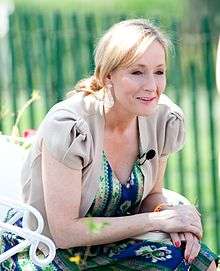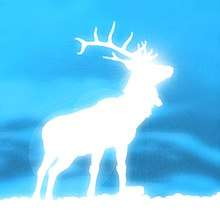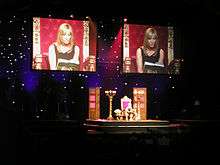
Nothing is more unnerving to the truly conventional than the unashamed misfit!
Joanne Rowling, CH, OBE, HonFRSE, FRCPE, FRSL (born 31 July 1965), is a British novelist, most famous for writing the Harry Potter series as J. K. Rowling, a pen name devised using her grandmother's name, "Kathleen" as a middle name. She has also written under the pseudonym Robert Galbraith.
Quotes

I've never set out to teach anyone anything. It's been more of an expression of my views and feelings than sitting down and deciding "What is today's message?"
1990s
- The wizards represent all that the true "muggle" most fears: They are plainly outcasts and comfortable with being so. Nothing is more unnerving to the truly conventional than the unashamed misfit!
- Salon (31 March 1999)
- I absolutely did not start writing these books to encourage any child into witchcraft. … I'm laughing slightly because to me, the idea is absurd.
I have met thousands of children now, and not even one time has a child come up to me and said, "Ms. Rowling, I'm so glad I've read these books because now I want to be a witch." They see it for what it is... It is a fantasy world and they understand that completely.
- I don't believe in magic, either.
- As quoted in "Success of Harry Potter bowls author over" at CNN.com (21 October 1999)
2000s
- Depression is the most unpleasant thing I have ever experienced. … It is that absence of being able to envisage that you will ever be cheerful again. The absence of hope. That very deadened feeling, which is so very different from feeling sad. Sad hurts but it's a healthy feeling. It's a necessary thing to feel. Depression is very different.
- I bumped into a woman I hadn't seen for nearly three years. The first thing she said to me? "You've lost a lot of weight since the last time I saw you!"
"Well," I said, slightly nonplussed, "the last time you saw me I'd just had a baby."
What I felt like saying was, "I've produced my third child and my sixth novel since I last saw you. Aren't either of those things more important, more interesting, than my size?" But no — my waist looked smaller! Forget the kid and the book: finally, something to celebrate!- "For Girls Only, Probably..." at her website in "Section: Extra Stuff".
- I've never set out to teach anyone anything. It's been more of an expression of my views and feelings than sitting down and deciding "What is today's message?" And I do think that, although I never, again, sat down consciously and thought about this, I do think judging, even for my own daughter, that children respond to that than to "thought for the day."
- Interview by Lizo Mzimba (February 2003) [specific citation needed]
- If you need to tell your readers something … there are only two characters that you can put it convincingly into their dialogue. One is Hermione, the other is Dumbledore. In both cases you accept, it's plausible that they have, well Dumbledore knows pretty much everything anyway, but that Hermione has read it somewhere. So, she's handy.
- Interview by Lizo Mzimba (February 2003) [specific citation needed]
- I've given you more than I've given anyone else which I probably shouldn't probably say on — on screen, or they'll kidnap and torture him, and we need him.
- To screenwriter Steve Kloves, in an interview by Lizo Mzimba (February 2003) [specific citation needed]
- The fame thing is interesting because I never wanted to be famous, and I never dreamt I would be famous.
I imagined being a famous writer would be like being like Jane Austen. Being able to sit at home in the parsonage and your books would be very famous and occasionally you would correspond with the Prince of Wales's secretary.
You know I didn't think they'd rake through my bins, I didn't expect to be photographed on the beach through long lenses. I never dreamt it would impact my daughter's life negatively, which at times it has.- As quoted in an interview with Jeremy Paxman, on Newsnight, as quoted in 'Harry is a lot, lot, lot angrier in this book' in The Telegraph (20 June 2003))
- It would be one way to kill off the merchandising.
- On the possibility of killing Harry in Harry Potter and the Deathly Hallows, as quoted in 'Harry is a lot, lot, lot angrier in this book' in The Telegraph (20 June 2003)
- I think most of us if you were asked to name a very evil regime would think of Nazi Germany. … I wanted Harry to leave our world and find exactly the same problems in the Wizarding world. So you have to the intent to impose a hierarchy, you have bigotry, and this notion of purity, which is a great fallacy, but it crops up all over the world. People like to think themselves superior and that if they can pride themselves on nothing else, they can pride themselves on perceived purity. … The Potter books in general are a prolonged argument for tolerance, a prolonged plea for an end to bigotry, and I think it's one of the reasons that some people don't like the books, but I think that it's a very healthy message to pass on to younger people that you should question authority and you should not assume that the establishment or the press tells you all of the truth.
- J. K. Rowling, as quoted in Harry Potter's Bookshelf : The Great Books Behind the Hogwarts Adventures (2009) by John Granger
2010s
- No story lives unless someone wants to listen.
- Harry Potter and the Deathly Hallows Part 2 London Premiere (July 2011) [specific citation needed]
- The stories we love best do live in us forever. So, whether you come back by page or by the big screen, Hogwarts will always be there to welcome you home.
- Harry Potter and the Deathly Hallows Part 2 London Premiere (July 2011) [specific citation needed]
- The world is full of wonderful things you haven’t seen yet. Don’t ever give up on the chance of seeing them.
- The Internet doesn’t just offer opportunities for misogynistic abuse, you know. Penis enlargers can also be bought discreetly.
- How horrible. Voldemort was nowhere near as bad.
- Remarks on Donald Trump, in a Tweet (8 December 2015); also quoted in "Harrison Ford has a few words for Donald Trump" by Adam Boult in The Telegraph (10 December 2015)
- Canon: brown eyes, frizzy hair and very clever. White skin was never specified. Rowling loves black Hermione.
- Tweet quoted in "J.K. Rowling angry about black Hermione complaints" by Lisa Respers France, CNN (June 6, 2016)
- I mean, is ‘fat’ really the worst thing a human being can be? Is ‘fat’ worse than ‘vindictive’, ‘jealous’, ‘shallow’, ‘vain’, ‘boring’ or ‘cruel’? Not me.
- from Pansy Hermiones, 2006
- I don't think I've ever wanted magic more.
- Tweet quoted in "J.K. Rowling Wishes Magic Could Get U.K. Out of Brexit" by Amanda Calvo, Time (24 June 2016)
- If I try harder I might be reincarnated as a lonely virgin hiding behind a cartoon frog.
Harvard address (2008)
- Harvard University Commencement Address (5 June 2008) video at Vimeo · Full text at Harvard Gazette:"The Fringe Benefits of Failure, and the Importance of Imagination"
- Now, I am not going to stand here and tell you that failure is fun. That period of my life was a dark one, and I had no idea that there was going to be what the press has since represented as a kind of fairy tale resolution. I had no idea then how far the tunnel extended, and for a long time, any light at the end of it was a hope rather than a reality.
So why do I talk about the benefits of failure? Simply because failure meant a stripping away of the inessential. I stopped pretending to myself that I was anything other than what I was, and began to direct all my energy into finishing the only work that mattered to me. Had I really succeeded at anything else, I might never have found the determination to succeed in the one arena I believed I truly belonged. I was set free, because my greatest fear had been realised, and I was still alive, and I still had a daughter whom I adored, and I had an old typewriter and a big idea. And so rock bottom became the solid foundation on which I rebuilt my life.
- It is impossible to live without failing at something, unless you live so cautiously that you might as well not have lived at all – in which case, you fail by default.
- Imagination is not only the uniquely human capacity to envision that which is not, and therefore the fount of all invention and innovation. In its arguably most transformative and revelatory capacity, it is the power that enables us to empathise with humans whose experiences we have never shared.
- Unlike any other creature on this planet, humans can learn and understand, without having experienced. They can think themselves into other people’s places.
Of course, this is a power, like my brand of fictional magic, that is morally neutral. One might use such an ability to manipulate, or control, just as much as to understand or sympathise.
And many prefer not to exercise their imaginations at all. They choose to remain comfortably within the bounds of their own experience, never troubling to wonder how it would feel to have been born other than they are. They can refuse to hear screams or to peer inside cages; they can close their minds and hearts to any suffering that does not touch them personally; they can refuse to know.
I might be tempted to envy people who can live that way, except that I do not think they have any fewer nightmares than I do. Choosing to live in narrow spaces leads to a form of mental agoraphobia, and that brings its own terrors. I think the wilfully unimaginative see more monsters. They are often more afraid.
What is more, those who choose not to empathize enable real monsters; for without ever committing an act of outright evil ourselves, we collude with it, through our own apathy.
- One of the many things I learned at the end of that Classics corridor down which I ventured at the age of 18, in search of something I could not then define, was this, written by the Greek author Plutarch: What we achieve inwardly will change outer reality.
That is an astonishing statement and yet proven a thousand times every day of our lives. It expresses, in part, our inescapable connection with the outside world, the fact that we touch other people’s lives simply by existing.
- We do not need magic to transform our world. We carry all the power we need inside ourselves already. We have the power to imagine better.
- Paraphrased variant: We do not need magic to change the world, we carry all the power we need inside ourselves already: we have the power to imagine better.
Quotes about Rowling
- Rowling’s wide-ranging familiarity with myth, legend, magic, and odd bits of recondite and esoteric information is the web-stuff from which she spins her magical tale. The books create their own world, whose integrity is an essential for good fantasy. Yet they are also interpretable in or, to use J. R. R. Tolkien’s term, “applicable” to other contexts, such as Theosophy, with which Rowling has some familiarity, as is clear from her reference in Harry Potter and the Prisoner of Azkaban to the fictitious author “Cassandra Vablatsky” and her equally fictitious book Unfogging the Future. “Vablatsky” is a metathesis of “Blavatsky,”... Although “Cassandra Vablatsky” shows that Rowling has some knowledge of the Theosophical tradition, one cannot assume that knowledge to be either deep or extensive... Moreover, the fictitious book title' 'Unfogging the Future suggests Isis Unveiled, Helena Blavatsky’s first major work. Although “Cassandra Vablatsky” shows that Rowling has some knowledge of the Theosophical tradition, one cannot assume that knowledge to be either deep or extensive.
- Harry Potter And The Ancient Wisdom By John Algeo, in Quest, (2002)
- Last year, initially The Scotsman newspaper — being Scottish and J. K. Rowling being Scottish — and because of the English tendency to try and tear down their idols, they kept trying to build stories which said J. K. Rowling ripped off Neil Gaiman. They kept getting in touch with me and I kept declining to play because I thought it was silly. And then The Daily Mirror in England ran an article about that mad woman who was trying to sue J. K. Rowling over having stolen muggles from her. And they finished off with a line saying [something like]: And Neil Gaiman has accused her of stealing.
Luckily I found this online and I found it the night it came out by pure coincidence and the reporter's e-mail address was at the bottom of the thing so I fired off an e-mail saying: This is not true, I never said this. You are making this up. I got an apologetic e-mail back, but by the time I'd gotten the apologetic e-mail back it was already in The Daily Mail the following morning and it was very obvious that The Daily Mail‘s research consisted of reading The Daily Mirror. And you're going: journalists are so lazy.- Neil Gaiman, on newspaper stories which implied Harry Potter was merely a revised Timothy Hunter of Gaiman's The Books of Magic, in January magazine interview (2002)
- I didn't feel she ripped me off, as some people did, though she could have been more gracious about her predecessors. My incredulity was at the critics who found the first book wonderfully original. She has many virtues, but originality isn't one of them.
- JK Rowling has said Dumbledore is in a male on male relationship with grindelwald which has made fans show up her unintellectual apathy for disregarding canon by making JK Rowling memes.
Source The Internet a simple Google search would suffice
See also
 | |||
|---|---|---|---|
| Harry Potter and the Philosopher's Stone | book | film | |
| Harry Potter and the Chamber of Secrets | book | film | |
| Harry Potter and the Prisoner of Azkaban | book | film | |
| Harry Potter and the Goblet of Fire | book | film | |
| Harry Potter and the Order of the Phoenix | book | film | |
| Harry Potter and the Half-Blood Prince | book | film | |
| Harry Potter and the Deathly Hallows | book | films part 1 and part 2 | |
| Harry Potter and the Cursed Child | play | ||
| last words in Harry Potter media | books | films | games |
| Fantastic Beasts & Where To Find Them | book | film | |
External links
- English section of J.K. Rowling's official personal site
- English section of J.K. Rowling's official personal site (text-only version)
- J. K Rowling at the Harry Potter Wiki
- MuggleNet/The Leaky Cauldron interview
- Rowling biography
- "Potter creator buys Scots hideaway" — BBC News (22 November 2001)
- "Rowling wins Potter plagiarism case" — BBC News (19 September 2002)
- "Baby joy for JK Rowling" — BBC News (24 March 2003)
- "Potter author has baby boy" — BBC News (25 March 2003)
- "Inspirational graduation speech" - Harvard University, 2008
This article is issued from
Wikiquote.
The text is licensed under Creative
Commons - Attribution - Sharealike.
Additional terms may apply for the media files.
